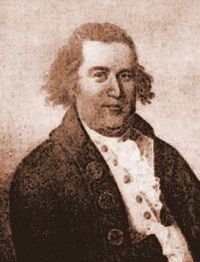William Dawes
| William Dawes, Jr. | |
|---|---|
 |
|
| Born |
6 April 1745 Boston, Massachusetts |
| Died | 25 February 1799 (aged 53) Marlborough, Massachusetts |
| Occupation | Tanner |
| Spouse(s) | Mehitable May (1768–1793; divorce) Lydia Gendall |
| Children | 6 with Mehitable May 1 with Lydia Gendall |
| Parent(s) | William and Lydia Dawes |
William Dawes, Jr. (April 6, 1745 – February 25, 1799) was one of several men and a woman who alerted colonial minutemen of the approach of British army troops prior to the Battles of Lexington and Concord at the outset of the American Revolution.
Dawes was born in Boston, Massachusetts on April 6, 1745, to William and Lydia Dawes (née Boone), and baptized at Boston's Old South Church. He became a tanner and was active in Boston's militia. On May 3, 1768, Dawes married Mehitable May, the daughter of Samuel and Catherine May (née Mears). The Boston Gazette noted that for his wedding he wore a suit entirely made in North America; at the time, Whigs were trying to organize a boycott of British products to pressure Parliament into repealing the Townshend Acts.
On April 8, 1768 Dawes was elected as a member of the Ancient and Honorable Artillery Company of Massachusetts. He was appointed as the Company's second sergeant in 1770. When the Company was revived in 1786, after becoming dormant during the American Revolution, he was appointed as the Company clerk. His father, William Dawes, Sr., was also a member of the Company.
It is likely that in September 1774, Dawes was instrumental in helping Boston's militia artillery company secure its four small cannons from British army control. The Massachusetts Provincial Congress certainly sent word to him in February 1775 that it was time to move two of those weapons out of Boston.
Dawes was assigned by Doctor Joseph Warren to ride from Boston to Lexington, Massachusetts on the night of April 18, 1775, when it became clear that a British column was going to march into the countryside. Dawes's mission was to warn John Hancock and Samuel Adams that they were in danger of arrest. Dawes took the land route out of Boston through the Boston Neck, leaving just before the military sealed off the town.
...
Wikipedia
